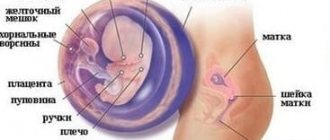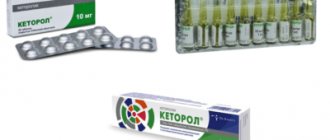0
Author of the article: Marina Dmitrievna
2017.08.03
331
Leukocytes
Throughout the entire period of bearing a child, women undergo routine blood tests. This helps monitor all important indicators, including neutrophil levels. These cells are part of white blood cells and can indicate abnormalities in health. But if neutrophils are elevated during pregnancy, this does not always indicate a disease.
Pregnancy
What is the norm during pregnancy
The leukocyte norm depends on the time of the analysis - before conception, after it, in the 2nd or 3rd trimester. The body of a pregnant woman practically does not use neutrophils, so their level during pregnancy should not greatly exceed their content in the patient’s blood before fertilization of the egg. Neutrophils are the most common type of leukocytes.
Mature segmented cells should number 40-78%. This measurement method is relative. With the absolute method, their norm is 1.8-6.6, multiplied by 10 to the 9th power, per 1 liter of blood. As a result, 74-76% of segmented and 7-10% of immature cells indicate normal leukocytes.
With a slight change in these indicators, the development of pathological processes is not observed, but if the content exceeds 80%, the woman should immediately contact a specialist. Rod cells that have not yet matured are also dangerous. Their large number indicates that the body is using critical reserves to eliminate a serious illness.
Important information: The norm of lymphocytes in a general blood test in women after 40 years
What does an increase in neutrophils in the blood indicate?
It is very important for a pregnant woman to observe the quantitative composition of bodies and cells in the blood, especially for neutrophils, they should predominate among other types of leukocytes. Even a slight deviation in the blood can indicate pathology. Neutrophils are responsible for the state of a woman’s immunity, and their indicator can warn of the development of an inflammatory process in the body. During pregnancy, the quantitative composition may change slightly. This does not indicate the disease at all, so for an accurate diagnosis, doctors may prescribe additional tests:
- Biochemical analysis.
- Check the blood for thickness.
- STIs are performed during pregnancy.
Reasons for the increase
The process of increasing neutrophils is neutrophilosis. Most cases occur in an adult due to an increase in the number of mature cells for various reasons. Often neutrophils are elevated in a pregnant woman due to infection entering the body. Changes in the blood are provoked by fungi, viruses, encephalitis infection or coccal flora. To protect the body, mature white blood cells begin to be released from the bone marrow and destroy harmful microorganisms.
When the source of infection is eliminated, the indicators become normal again.
The change in the number of segmented neutrophils is influenced not only by infection, but also by other factors. These include:
- drug, food or chemical poisoning;
- surgery or other diagnostic measures;
- autoimmune diseases, including lupus erythematosus, rheumatoid arthritis and thyroiditis;
- acute allergy attack;
- violation of tissue integrity due to burns, bone fractures, wounds, bruises or hematomas;
- tissue death due to gangrene, stroke and other pathologies;
- development and increase in malignant or benign neoplasms;
- use of hormonal drugs;
- diabetes.
If band neutrophils are enlarged, this indicates reactive inflammation in the body of a pregnant woman. These conditions contribute to the rapid flow of processes when the body does not have time to create mature cells and uses rod species. This is due to the presence of:
- trophic ulcers;
- heavy metal poisoning;
- abscess;
- emotional overexcitation;
- skin diseases;
- tumors of internal organs;
- heart attack;
- excess carbon dioxide in the blood;
- blood loss;
- pneumonia.
Neutrophil levels may change when the number of other types of white blood cells falls. These processes lead to a shift in the leukocyte formula. With a pathological reduction of lymphocytes, an increase in neutrophils occurs. In this case, the reason for the changed indicators will be different, so the absolute value of neutrophils is measured to make sure that changes have occurred.
Important information: What does low platelet count mean in an adult?
Functions of neutrophils in the body
Neutrophils are an important component in the blood; they can indicate the state of a woman’s immunity; highly elevated band neutrophils during pregnancy mean that there is inflammation in the expectant mother’s body. When blood analysis shows that such inflammation is occurring, this does not necessarily indicate an infectious disease. As a rule, a woman may not feel any symptoms, other indicators may well remain normal.
When a woman's segmented neutrophils are increased during pregnancy, this is normal, since all her cells become mature.
Treatment
Before starting treatment, it is necessary to conduct a full examination and diagnosis. This should be done by an experienced specialist, selecting medications with caution, since many medications are contraindicated when carrying a child. The following are often used for therapy:
- Elivit Pronatal;
- Polygynax;
- Vilprafen;
- Viferon;
- Oscillococcinum.
In addition to medications, when neutrophils in the blood are elevated, dietary changes are used. There is no special dietary program during the treatment of neutrophilia, so you need to adhere to standard recommendations for the correct and balanced consumption of foods. To do this, they use products that are characterized by the presence of a large number of microelements that are necessary for the normal functioning of the body. The expectant mother should exclude from the diet:
- carbonated drinks and water;
- fat;
- spicy;
- roast;
- canned.
Dishes made from lean meats, seafood, cereals, fruits and vegetables will be healthy. Steaming is used as a cooking method. Portions should be small and meals should be fractional. The patient must monitor her drinking regime.
Consequences for mother and child
Without treatment, negative changes occur in a woman’s body, which can cause:
- strengthening the inflammatory process;
- heart failure;
- intoxication;
- stroke;
- development of a malignant tumor.
In advanced cases, the death of mother and child occurs.
The danger of abnormalities in the blood
If significant changes are noticed in the blood readings, this may indicate health problems. For a pregnant woman, all this can result in serious inflammation, a tumor, heart failure or stroke, and even poisoning, but the worst thing is that the expectant mother may lose her child.
If neutrophils abs. elevated during pregnancy, this may precede the possibility of miscarriage. This often becomes real when a lot of toxins enter a woman’s blood, which causes a hormonal imbalance and the woman’s body begins to independently try to cope with a problem that poses a threat to the life of the expectant mother.
View gallery
Prevention
If the doctor notes an increase in the level of ABS neutrophils in the blood during pregnancy, he will prescribe additional studies to determine the source of the changes. To avoid serious consequences and worsen your health, you need to follow the recommendations:
- reduce physical activity;
- do not visit public places when viral diseases are widespread;
- take medications prescribed by a specialist;
- take a walk in the fresh air as often as possible;
- get enough sleep and rest more;
- do not consume foods high in food additives and substitutes, replacing them with natural products.
Important information: What do low leukocytes mean in a blood test in women (reasons for low levels)
Preventive measures will help speed up recovery and normalize the level of leukocytes.
Summing up
During pregnancy, a woman needs to closely monitor her health, undergo all examinations in a timely manner and take blood tests during pregnancy in order to avoid dangerous consequences.
As a rule, in most cases, a low level of neutrophils in pregnant women indicates the development of some pathology or infection that may threaten your baby. Therefore, we recommend that you seek help from your doctor as soon as possible.
A slight increase in neutrophils in the blood during pregnancy of a girl, although it fits into the norm, also requires consultation with a doctor. After all, you may miss the formation of any disease that can cause premature birth or miscarriage.
Almost any disease can be cured if it is identified in the early stages of development. Therefore, we recommend that you take all tests on time and have a monthly consultation with a gynecologist.
Preparing for analysis
Segmented neutrophils are determined by taking a clinical (general) blood test with a formula (it can also be called a detailed one). Capillary blood is collected from a finger. In this case, the laboratory assistant treats the phalanx with alcohol with a 70% concentration. After this, the soft tissue of the finger is pierced with a disposable needle. The first blood is removed with a sterile cotton swab. Subsequent blood is taken for collection.
Interesting: Suture Festering After Caesarean Section What to Do
There are simple rules for conducting analysis:
- The test is usually taken on an empty stomach early in the morning.
- The day before the test, you should not stress yourself physically or emotionally.
- If there is a threat to a person’s life, blood is taken without any preparatory measures.
- Experts say that rubbing your fingers against each other helps to increase the level of leukocytes, so such manipulations should be avoided immediately before taking the test.
- In addition, you should not smoke an hour before taking the test.
Concept of neutrophils
What kind of cells are these, and what role do they play in the human body? Neutrophils are a type of white blood cell that are produced in the bone marrow. They are classified as granulocytes due to their special structure - the cytoplasm of these cells has a granular structure.
In the human body, neutrophils are distributed unevenly. Most of them are found in the bone marrow. They are also found in the blood and a little in the internal organs.
Neutrophils are able to respond to changes occurring in the body. Any disturbances in the functioning of the immune system are reflected in their level. It increases or, conversely, decreases.
But a deviation from the norm does not always indicate a pathological process. In pregnant women, this phenomenon occurs due to a decrease in the body's immune defense.
Neutrophils during pregnancy - what are they?
Neutrophils (neutrophil granulocytes) protect internal organs and body systems from the harmful effects of bacteria, viruses and parasitic single-celled fungi. The body's performance in relation to neutrophils is impressive: 7 million of these cells appear in the blood every minute.
The source of neutrophils is red bone marrow. There they mature, and then seep through the capillary walls into the blood, where they remain from 8 hours to 2 days. Then mature cells move into the tissues of the body, where they perform their main function: they detect the pathogen, absorb it and subject it to irreversible destruction, after which they die. All inflammatory reactions in the body occur with the participation of neutrophils. They are among the first to concentrate at the source of inflammation, where the real battlefield unfolds: one neutrophil cell is capable of destroying about 30 dangerous bacteria at one moment.
By the level of this type of leukocytes, doctors can judge the presence of inflammatory and necrotic pathologies, fungal infections, etc. in the patient’s body. In some advanced cases of the disease, neutrophils undergo deformation, and then the phenomenon of toxic granularity occurs, which can be observed under a microscope.
Segmented neutrophils are increased
To determine the overall picture of a person’s health, a blood test is performed.
This method is quite reliable and allows a specialist to learn a lot. In the general analysis, the percentage of different types of leukocytes is calculated. So, if segmented neutrophils are elevated, this may indicate the presence of serious diseases that require immediate treatment. What are segmented neutrophils?
These cells got their name due to the segments that make up the nucleus. These segments, the number of which in the nucleus can vary from two to five, allow leukocytes to move to various organs. When they enter body tissues, they determine the presence of foreign organisms and, absorbing them, eliminate them.
In the peripheral blood there are band leukocytes, which represent the initial stage of the development of segmented bodies. The duration of stay of mature neutrophil cells in the blood is longer, therefore their percentage is higher than that of immature cells.
However, during the analysis, deviations in the content of both neutrophils are taken into account. Since their decrease may indicate quite serious diseases.
Segmented neutrophils and leukocytes are increased
All neutrophils are divided into band and segmented. Normally, the number of rods is 1-6%, and segmented - 70%. The function of cells is to protect humans from foreign organisms, viruses and microbes. Neutrophils have the ability to move to the site of inflammation. The process of increasing the number of neutrophils is called neutrophilia.
As a rule, with neutrophilia, segmented and band neutrophils increase in an adult. Sometimes immature myelocytes appear in the blood. The appearance of such cells and a simultaneous increase in neutrophils leads to a shift of leukocytes to the left, which is often accompanied by the appearance of toxigenic granularity in them. This phenomenon occurs when the body is affected by various infections, the presence of inflammation, as well as during a heart attack and shock.
Segmented neutrophils are increased - reasons
When segmented cells in the blood are elevated, this may indicate the presence of an acute infectious disease in the body, the presence of a malignant tumor or intoxication, which is characterized by the accumulation of microbes and the products of their activity.
Changes in blood composition may indicate:
- development of infections (spirochetosis, mycosis, tick-borne encephalitis);
- the existence of tumors, leg diseases;
- nephropathy and dysfunction of the urinary system;
- processes of inflammation in gout, arthritis, rheumatism, pancreatitis, tissue damage;
- an increase in blood sugar.
Segmented cells are increased and lymphocytes are decreased
A situation is possible in which the number of neutrophils is reduced and the number of lymphocytes is increased. This phenomenon is called lymphopenia, and it develops mainly due to renal failure, the development of acute infectious pathologies, chronic infections, radiotherapy, radiation treatment, terminal stage of cancer, after applastic anemia, and also after long-term use of cytostatics. A change in the concentration of lymphocytes also indicates the appearance of leukemia, the cause of which was trauma, and the occurrence of malignant formations.
In addition, the reasons why the number of segmented cells is increased may be physiological changes associated with prolonged stress, premenstrual syndrome and overexertion.
All neutrophils are divided into band and segmented. Normally, the number of rods is 1-6%, and segmented - 70%. The function of cells is to protect humans from foreign organisms, viruses and microbes. Neutrophils have the ability to move to the site of inflammation. The process of increasing the number of neutrophils is called neutrophilia.










